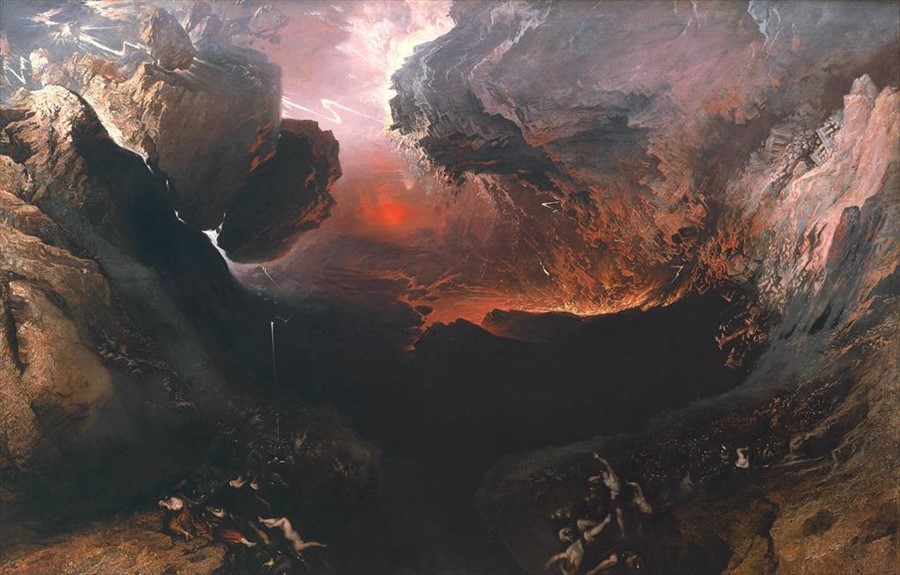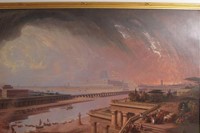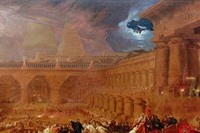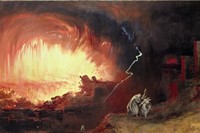Author and laconic TV personality Will Self’s first novel Cock and Bull imagined a world where men and women swapped sexual organs. The prolific author’s later novels include The Book of Dave – in which a cab driver’s rants are discovered 500 years
"John Martin's apocalyptic paintings deal with the impact of 19th century urbanisation on a Biblical world view. They are the end of a real world envisaged through the frame of transcendentalism, hence the impossibilist horizons, the vortices of bricks and mortar, the reduction of human figures to fly-specks in a maelstrom of the unbuilt environment. I wanted to choose three modern disaster movies that recast Martin's own preoccupations for the current era. The Day the Earth Caught Fire juxtaposes the then (1961, Cuban Missile Crisis looming) modish anxiety about nuclear warfare with the zeitgeist of contemporary London – told through the focus of a news reporter, the film still has a lot to say about the interaction between news and reality. Moving on to the 70s, in The Towering Inferno (1974) apocalypse is – looked at one way – confined to the immolation of the world's tallest building on the day of its inauguration. But looked at another way the eponymous tower is the tower of Babel, and this a fable about the hubris of humankind – the burning of the tower (an eerie prefiguration of the Twin Towers terrorist attack), is a symbolic attack upon the pretensions of Modernism itself, and the desire of late capitalism to shape wholly artificial environments. Fire was an element Martin was very happy with, and it is, of course, a typically Biblical form of annihilation. Coming up nearly to the present with The Day After Tomorrow (2004) we see preoccupations with global warming given a wholly fantastical treatment by Roland Emmerich, the doyenne of CGI. Here, Gaia's revenge is over and done with in a matter of days, leaving the earth as a silvery icebound Christmas bauble spinning in the infinity of space. The concentration on the scientist-who-knows and his inability to get others-to-listen, is a retread of the significance of gnostic insights into the end-of-days as against the worldly preoccupations of the established early church. What I'm trying to say here is that when it comes to apocalypse – at least in the Judaeo-Christian mindset – it’s impossible to depart from a script that was written millennia ago!"
"When it comes to apocalypse – at least in the Judaeo-Christian mindset – it’s impossible to depart from a script that was written millennia ago!"
Author and laconic TV personality Will Self’s first novel Cock and Bull imagined a world where men and women swapped sexual organs. The prolific author’s later novels include The Book of Dave – in which a cab driver’s rants are discovered 500 years later and received as a holy text – and The Butt, a political allegory based loosely on Joseph Conrad’s Heart of Darkness. A dedicated walker, Self’s most recent, eighth novel is Walking to Hollywood, a surreal mix of memoir, fiction and fact, focusing on a 120-mile circumambulation of pedestrian-unfriendly Los Angeles.
Inspired by the apocalyptic visions of heaven and hell painted by bombastic 19th century painter John Martin, Self has chosen three films containing similar scenarios of death, destruction and doom to accompany Tate Britain’s current exhibition John Martin: Apocalypse. Reflecting their era’s own preoccupations, The Day the Earth Caught Fire, The Towering Inferno and The Day After Tomorrow will be screening at the Tate, while Self will be discussing his choices on Tuesday November 29 with Professor of the Royal College of Art Joe Kerr.
Will Self: John Martin film selection takes places at Tate, 18:30-21:30, November 29 2011.
Text by Hannah Lack



